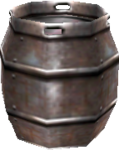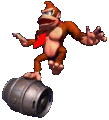Iron Barrel
- “Unlike regular barrels, steel kegs are basically unbreakable. Once you throw one, it will keep on rolling, knocking out any enemies it runs into.”
- —Donkey Kong Country instruction booklet, page 17
An Iron Barrel, also known as a steel keg or Steel Barrel[1][2], is a type of barrel in the Donkey Kong franchise, made of steel. They first appear in Donkey Kong Country.
History
Donkey Kong Country / Donkey Kong Land
In Donkey Kong Country, steel kegs are found as early as the first level, Jungle Hijinxs. Donkey Kong and Diddy Kong can usually find a steel keg by falling onto a ground patch from a height.
Steel kegs can be picked up and thrown like regular Barrels, although steel kegs are more durable because they do not break from hitting a wall or enemy. Upon hitting a wall, the steel keg ricochets, and it continues to roll until it falls into a gap or by hitting one of the stronger enemies. The steel keg defeats almost every enemy that it rolls into; as such, it can be used to defeat entire chains of baddies. The Kongs can even jump on top of a rolling steel keg as it travels on the ground and defeats enemies. Steel kegs can be reused, as a Kong can pick up a thrown barrel as it rolls by (and thus carry the barrel to a new location and throw it again). Steel kegs do not appear in many levels; at the start of both Jungle Hijinxs and Orang-utan Gang, the Kongs can throw a steel keg and ride it through a portion of the level.
Steel kegs also appear in Donkey Kong Land and have the same purpose as in Donkey Kong Country.
Donkey Kong Country 3: Dixie Kong's Double Trouble! / Donkey Kong Land III
Steel Barrels do not appear in Donkey Kong Country 2: Diddy's Kong Quest and Donkey Kong Land 2, but they return in both Donkey Kong Country 3: Dixie Kong's Double Trouble! and Donkey Kong Land III. Steel Barrels are much more prevalent than in the first game and are found in every level except boss levels.
Dixie Kong and Kiddy Kong are required to use a Steel Barrel to defeat a Koin for its DK Coin. The Koin is always facing the Kongs, holding a shield to protect himself from frontal attacks. The lead Kong must pick up a nearby Steel Barrel and throw it at a wall behind Koin. Being stronger than Dixie, Kiddy also throws them faster. The Steel Barrel bounces off the wall and rolls behind into Koin, who is defeated and leaves behind a DK Coin. After the Kongs use the Steel Barrel, another one appears in its place (except for ones that appear from a No Animal Sign).
Some Bazukas blast out Steel Barrel from their cannon. If the lead Kong gets hit by one, the player loses that Kong. Dixie and Kiddy usually have to jump from the Steel Barrels to cross large gaps and reach the other side. Sometimes the Bazukas are firing TNT Barrels, which the Kongs can change to Steel Barrels by jumping at a Switch Barrel. At the bottom of the Krematoa level Criss Kross Cliffs, there is a Bazuka blasting Steel Barrels upward.
In Donkey Kong Land III, Steel Barrels appear in most levels. They are still required to defeat a Koin and obtain its DK Coin, although in underwater levels, the DK Coin appears by itself, which means that Steel Barrels do not appear in every level. The Kongs cannot ride on top of a Steel Barrel in the game.
Donkey Kong 64
In Donkey Kong 64, three Steel Kegs appear in a mill in Fungi Forest, and they are larger and heavier than in previous games. Chunky Kong is the only Kong with the strength to carry the Steel Barrels. He must pick up each Steel Barrel and throw them into a grinder within a time limit, to obtain a Golden Banana. Somehow the Steel Barrels explode when they crash into the grinder.
Donkey Konga
Steel Barrels also appear in Donkey Konga, where one is used in the unlockable mini-game, Bash K.Rool. To fit the Whac-A-Mole theme, it is referred to as the "Barrel Hammer". In the mini-game, the player's objective is to whack the Barrel Hammer onto King K. Rool's head. Despite its name, the Barrel Hammer is not connected to a hammer handle but rather to metal chains capable of lifting it up and down.
Two Steel Barrels appear in the background of Challenge mode, on the bottom screen next to Rambi. The Steel Barrels have a display attached displaying the song number that the player is on.
Donkey Kong Barrel Blast
Iron Barrels appear as obstacles in the racing game Donkey Kong Barrel Blast. Racers can destroy an Iron Barrel while invincible.
DK: Jungle Climber
Iron Barrels appear as obstacles in DK: Jungle Climber. They float in the air, blocking pathways, and Iron Barrels can be destroyed by either using Diddy Kong's hammer, detonating a TNT Barrel near the Iron Barrel, or by throwing a Bomb at it.
Official profiles
Donkey Kong Country
- Super Nintendo Entertainment System instruction booklet: "Unlike regular barrels, steel kegs are basically unbreakable. Once you throw one, it will keep on rolling, knocking out any enemies it runs into. You can also throw one of these barrels against a wall and jump on top of the rebound. You'll be in for a wild ride if you can pull off this move!"
- Game Boy Advance instruction booklet: "Roll steel kegs to take out several enemies at a time. You can also bounce one off a wall, then hop onto it for a smooth ride"
Donkey Kong Country 3: Dixie Kong's Double Trouble!
- Game Boy Advance instruction booklet: "Throwing one of these is a fantastic way to clear and area of enemies. And they're reusable, too, if you're careful!"
Gallery
Names in other languages
| Language | Name | Meaning |
|---|---|---|
| Japanese | アイアンバレル[3] Aian Bareru |
Iron Barrel |
References
| Donkey Kong Barrel Blast | ||
|---|---|---|
| Playable characters |
Kongs | Donkey Kong (Ultra Barrel) • Diddy Kong • Dixie Kong • Lanky Kong • Tiny Kong • Funky Kong • Wrinkly Kong • Cranky Kong |
| Kremlings | Kritter • Kip • Kass • Klump • Kalypso • Kludge • Kopter • King K. Rool | |
| Non-playable character | Candy Kong | |
| Cups | Topaz Cup | DK Jungle • Salty Sea • Mt. Dynamite |
| Sapphire Cup | Scorching Canyon • DK Jungle Falls • Shimmering Sea • Mammoth Glacier | |
| Diamond Cup | Open Ocean • Mt. Dynamite Remix • Parched Palace • Cranky's Temple | |
| Platinum Cup | Dynamite Run • DK Jungle Sunset • Alpine Peak • Temple Heights • Cosmic Highway | |
| Other | Gallery | |
| DK: Jungle Climber | ||
|---|---|---|
| Characters | Playable | Donkey Kong • Diddy Kong • Dixie Kong • Funky Kong |
| Non-playable | Candy Kong • Cranky Kong • Wrinkly Kong • Xananab | |
| Enemies and obstacles | Bramble • Click-Clack • Flipflap • Flitter • Ghost • Klobber • Kritter • Lockjaw • Mini-Necky • Neek • Puftup • Shuri • Spike • Zinger | |
| Bosses | Banana Ship • Junklomp • Mega Amp • Draglinger • King K. Rool | |
| Items | Banana • Banana Bunch • Banana Coin • Crystal Banana • Crystal Star • DK Coin • Gem • Hammer • KONG Panels • Oil barrel • Torch • Wings | |
| Objects | Booster Barrel • Cannon Barrel • DK Barrel • Exit • Giant flower • Handle Peg • Iron Barrel • Jack Peg • Mine • Peg • Peg Board • Question Barrel • Rock • Spike • Spirowarp • Spinner Barrel • Spinning Peg • Switch Peg • TNT Barrel | |
| Worlds | Sun Sun Island • Lost Island • Ghost Island • Chill 'n' Char Island • High-High Island • Wormhole • Extra Stages | |
| Minigames | Rolling Panic • Banana Grab • Speed Climb • Throw 'n' Crush • Orange Picker • Booster Battle • Banana Bonanza | |



